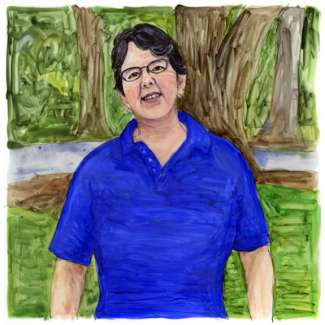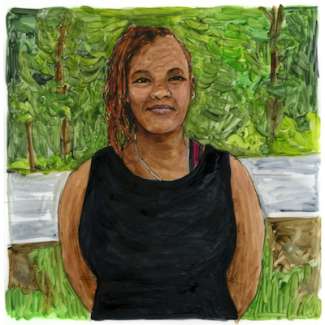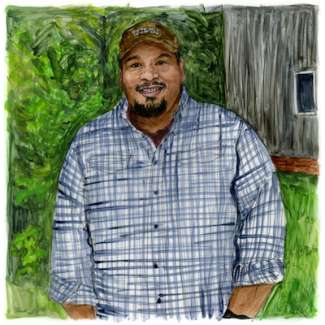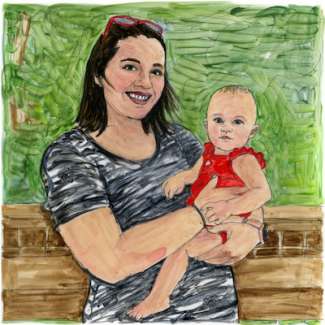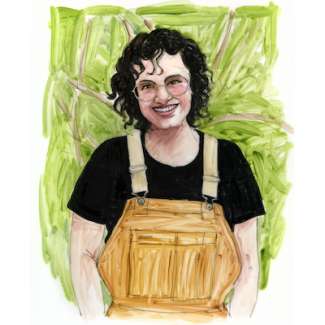Jump To:
Stacie Hagwood
Stacie Hagwood was Director of WCWP from 2015-2022, carrying forward Dr. Norman and Betty Camps’ vision for the park and education center. After retiring, Stacie returned as a part time employee, doing “all the things I really like to do, including helping connect kids with nature.”
Walnut Creek Wetland Park initially opened in 2009 as the Walnut Creek Wetland Center. A community effort to honor Dr. Norman Camp and his wife Betty led to the Raleigh City Council changing the name of the building to the Norman and Betty Camp Education Center in 2018.
My original career was as a law enforcement officer with the City of Raleigh, starting in 1985, but in the 1990s, I made the decision to stay home with my kids. I began to reinvent myself as an environmental educator around 2010. I worked for the Museum of Natural Sciences for six years, and I went back to graduate school. I started as Director of the Park in November of 2015. It was the first full-time job I'd had 17 years.
I had watched it be built because my kids went to school across the street at Carnage Elementary, but I didn't fully know the story of how the park had come to be until I met Dr. Norman Camp and his wife, Betty, and fell in love with them as people, and with the story of the park. Because truly, without the story, and how it came to be, it's just a place. And it's so important that we continue to share the story, because it is an environmental justice story. It is not just about a bunch of people at St. Ambrose who came together and said we should have park here. This is about making lemonade out of the lemons that have been handed to this community over decades and decades.
Dr. Camp’s dream was that there would be a place for children who live in this community to be able to learn about nature without having to get on a bus to go someplace. He wanted children to be comfortable learning about things that he did as a child, that consequently came naturally to him. He was passionate about kids having a hands-on experience and developing their scientific minds through exploration. We've been able to expand, and Partners for Environmental Justice has been instrumental in helping to push the vision that Dr. Camp had forward.
Since retiring in December of 2022, I have come back as a part-time employee. Now I get to do the things that I really like to do, which is helping to connect kids with nature and spending time outdoors, removing invasive plants, picking up trash, planting, flowers, weeding, those are the things that actually feed me. I get to do all the fun stuff without all the administrative responsibilities. Watch Stacie tell her story.
Cypriane Jacobs
Cypriane Jacobs lives near Walnut Creek with her son Cayden. She has participated in creek cleanups and trash pickup along the park trails.
I live in this neighborhood, 5 minutes away. I'm 25. I used to be in a service organization called Top Teens of America. We did partnerships with Walnut Creek Wetlands Center. We did trash pickup along the trails, and our service organization did projects alongside them for the community.
Q: What was rewarding about it?
C: Just knowing that by picking up the trash, I'm helping out my community to be a better place for people to live and enjoy themselves. We pulled out a tire, couches, a lot of trash. Tires and car parts.
I noticed sometimes at our church, the creek might overflow. And then alongside the streets, people sometimes will dump their furniture. I don't like it.
Q: What do you want to say to the people that are dumping that stuff?
C: STOP! It’s hurting the animals and it is killing our environment! Watch Cypriane tell her story.
George C. Jones
George C. Jones, Jr., the Executive Director of Partners for Environmental Justice, grew up in Biltmore Hills and is a longtime member of St. Ambrose Episcopal Church. He is working to honor Dr. Norman Camp’s vision for WCWP while he leads PEJ into the next era of environmental stewardship and restoration.
I am the Executive Director of Partners for Environmental Justice. I've been in nonprofit management for over 10 years.
I grew up in Biltmore Hills. My parents built our house at 2008 Gilliam Lane, it was their first home. My father was the assistant principal at Carnage Middle School. The area behind the Wetland Center was like a backyard for me. I had an appreciation for outdoors growing up. I also experienced flood area activities.
I've been baptized, married and confirmed in St. Ambrose Episcopal Church.
Norman and Betty Camp were members of St. Ambrose. In the early 1990s, church and community leaders came together to say to the City of Raleigh, we've got to do something about the dumping, the degradation of the creek bed. We don't have enough investment in this community to protect people's lives and livelihoods.
Partners for Environmental Justice was formed out of three churches: Trinity Episcopal Church in Fuquay-Varina, St. Paul’s Episcopal Church in Cary, and St. Ambrose. St. Ambrose supported Dr. Camp’s leadership and his priority of educating the community about the importance of the habitat and wetland protection of Walnut Creek.
Trust issues between the city and residents go back to the building of the first Black subdivisions in Raleigh. They designated the first neighborhoods for African Americans in a floodplain area. In the early 20th century, the area along Walnut Creek was a junkyard full of trucks and vehicles. Walnut Creek has high nutrients and chemical toxins that come off the streets and flow into the creek beds, and those contaminate the wetlands.
When Norman Camp visualized the Center, it was an opportunity to put a flag in the air and say, we live here, we care about our community, we’re not going anywhere. We want Walnut Creek to be a part of the solution to build a better model.
Some of the solutions we’re promoting in community partnerships are individual scale solutions, like using cisterns at your home that filter water for gardening or removing impervious surfaces like asphalt driveways and replacing them with porous surfaces. Some solutions require investment from the city or even federal government.
Raleigh is one of the fastest growing communities in the country. Targeted economic development really can only expand south and southeast of downtown into historically Black neighborhoods, adjacent to the Walnut Creek Watershed. I think equitable development would be making sure that any displacement is done in a way that's environmentally and economically beneficial to the residents living in the community.
The benefit of having the WCWP here, as an example of infrastructure improvement, is to address the degradation of the streams and creeks, the dumping and debris in the watershed, and the history of raw sewage and contamination to water quality, particularly affecting minority communities. It becomes a working experiment and demonstration of what can and should be done in helping to address the problem.
Kasey and Gwyn
Kasey and her family were visitors to Mud Day 2023 at Walnut Creek Wetlands Park.
We live in Willow Springs, about 29 minutes away. I found out about Walnut Creek Wetlands Park and my son loves being outdoors and in mud so I thought it was perfect. We’re new to the area, and it's a great way to get to know Raleigh a little bit better. We just up and moved in December 2022, to be honest, we packed up, quit our jobs in Pennsylvania, and moved to the area. Our daughter, Gwyn, was just a few weeks old when we moved. Now she's over 2, spending the vast majority of her life here in NC.
We really liked the idea that there are still four seasons in North Carolina, and it’s a city but it's a little more rural and cultural than some bigger, major, more urban cities. Today, there's been a lot of beekeeping, picking up nectar and putting it away, and the huge mudslide down into the mud pool. That's been the big hit. And baby girl took a nap. Following some medical diagnoses, my husband is currently a stay-at-home dad. While trying to get his myasthenia gravis under control, he also takes care of the house and the primary stuff for both children. I have been working as a State Probation/Parole Officer since August 2023. Watch Kasey tell her story.
Celia Lechtman
Celia Lechtman is the Assistant Manager at Walnut Creek Wetlands Park, in charge of land management and conservation, in charge of volunteer initiatives.
I have been with Walnut Creek since June 2023. I am the assistant manager, and I'm in charge of land management and conservation, and I'm also in charge of all of our volunteer initiatives.
I grew up in Northern Virginia, in the suburbs of DC. I went to school in Boston. I was in Boston and Cambridge and Western Massachusetts for nine years.
I lost the job I had up there because of COVID, and moved to Durham, totally sight unseen, to teach a COVID Micro-school where we spent almost all of our time outside. My background is in education, so I started in theater and arts education, moved into outdoor education, and a whole bunch of things happened in between, but I loved the Triangle so much that I stayed and ended up here.
I have an outdoorsy-ish, environmental-ish family. My dad is a really big carnivorous plant enthusiast, so when I was a kid, he had these raised bed bogs in our backyard, and the only way to get the water out of the bogs is to mouth siphon it. So, he used to have me mouth siphon the bog water out of the raised bed carnivorous plant bogs. And I think the swamp somehow got into my blood! I've been really into particularly wetland environments for a really long time, and environmental stewardship and connecting people to the places that they live.
I absolutely love my job. The people are incredible. The community is incredible. And the wetland center itself has a really beautiful story of community resilience, this amazing grassroots comeback story. There is resilience and toughness and pride. I feel really proud amplifying and telling the story of this place.
